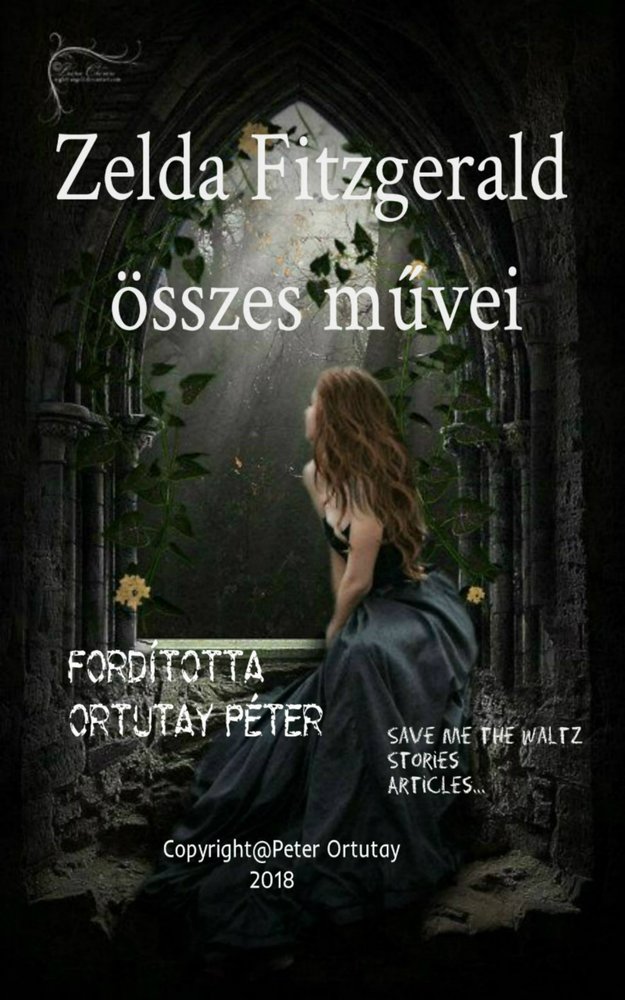Zelda Fitzgerald most már akár világhírűnek is mondható A valcert táncolja velem (Save Me the Waltz) című regényében sok olyan eseménnyel találkozhat az olvasó, melyrÅl férje, F. Scott Fitzgerald is ír, vagy tesz említést, világhíres regényében, Az Éj Szelíd trónján-ban. Ám Zelda távolról sem plagizált, nem is tehette, hisz könyve 1932-ben jelent meg, míg Az éj szelíd trónján két évvel utána. Így már eleve elmondhatjuk, hogy bármi legyen is Zelda Fitzgerald könyvének az érdeme, vagy hibája, mindenképpen irodalmi kuriózum. Zeldának volt írói vénája, és tehetsége is az íráshoz, mint ahogy legalább közép szinten a festészethez és a baletthez is. Ezt a Vezesse F. urat és feleségét a ... számú szobába című rövidke történet is mutatja, melyet, mint szerzÅ Scott Fitzgerald is aláírt ugyan, de sokkal inkább a feleség volt az, aki megírta. A férj legfeljebb átnézte és kiegészítette, ahol úgy gondolta, hogy ki kell egészíteni. De ez a regény egy egészen önálló mű, mely, mint minden jó irodalmi műalkotás, a leghitelesebben tudja ábrázolni azt a frenetikus kort, az elmúlt évszázad húszas éveit, amiben Fitzgeraldék is éltek. Így tehát nemcsak irodalmi kuriózum, hanem sokkal több annál. Nem elhanyagolható része az amerikai irodalomnak. Már csak azért sem az, mert nemcsak Amerikában, de világszerte az olvasók mind szélesebb körei kezdenek egyre nagyobb érdeklÅdést mutatni F. Scott Fitzgerald élete és művei iránt. Hogy miért? Ennek egyik oka minden bizonnyal a híres Fitzgerald páros történetében keresendÅ. E történet (nagyon röviden) a következÅ.
Nem sokkal az elsÅ világháború után Scott Fitzgerald megkérte Zelda Sayre kezét, akit az alabamai Montgomeryben ismert meg, amikor az elsÅ világháború idején ott állomásozott, mint bevetésre váró katonatiszt. Zelda másodszorra mondott csak igent. Akkoriban Fitzgerald kezdÅ író volt csupán, de jók voltak a kilátásai. 1920-ban elsÅ regénye, Az ÉdentÅl messze (This Side of Paradise), sikert aratott. Aztán tovább és sokat dolgozott; erejét nem kímélve írta sorozatban elbeszéléseit a Saturday Evening Post-nak, hogy biztosítsa magának és feleségének azt az életformát, mely kijár - gondolhatta - a sikeres embernek Amerikában. 1925-ben jelent meg harmadik regénye, A nagy Gatsby. Nagyon jó kritikát kapott, de csalódást jelentett anyagilag. Kilenc évvel késÅbb látott napvilágot a negyedik regény, Az éj szelíd trónján, és akkor máris a témánál, Zelda könyvénél vagyunk.
Egy olyan rövid életrajzba, mint amilyet fentebb vázoltunk, aligha fér bele az a bonyolult konfliktushalmaz és feszültség, mely Fitzgeraldék életét jellemezte. Az írótárs Hemingway úgy látta, hogy az együttélést a feleség mérgezi, mert féltékenységével állandóan zavarja férje munkáját. Azok az óriási erÅfeszítések Zelda részérÅl, hogy festÅművész, balerina vagy író legyen, ennek a féltékenységnek voltak részei. Zeldának mindenhez volt tehetsége, de végtelenül frusztrálta, hogy nem tud élni vele; így például akkor kezdett el komolyan balettozni, amikor már túl idÅs volt hozzá (28 éves). TúlerÅltette magát, beteg lett (skizofrén) és élete végéig gyógykezelésre szorult.
Sokáig nehezen lehetett valamit megtudni Zelda regényérÅl. Fitzgerald életrajzíróit valahogy hidegen hagyta a téma. De aztán egyikük (a neve Dan Piper) egy egész fejezetet szentelt könyvében ennek a regénynek. És a legnagyobb elismeréssel ír róla.
A regény magáról Zelda Fitzgeraldról szól, aki Alabama Beggs néven szerepel könyvében. Alabama egy csodálatosan okos lány, és azon kívül igazi déli szépség. Nem véletlen, hogy Fitzgerald modellként használta feleségét a húszas évek szépséges és kívánatos lánykáinak az ábrázolására, amikor regényeit és elbeszéléseit írta. Nem véletlen az sem, hogy Zelda és férje emblematikus figurái lettek az akkori idÅk élvezetre vágyó és anyagi jólétre törekvÅ fiataljainak. Aztán, amikor Zelda Fitzgerald idegösszeroppanással a Baltimore-i Johns Hopkins Kórházba került, regényét döbbenetesen gyorsan, alig néhány hét alatt megírta.
Amikor 1932 Åszén Zelda könyve megjelent New Yorkban, a kritika fanyalogva fogadta. 1953-ban viszont a második kiadás Londonban bestseller lett.
Sikerét azonban Zelda már nem érte meg. Öt évvel korábban az észak-karolinai asheville-i kórházban, ahol kezelték, tűz ütött ki, és... nem tudták kimenteni.
Zelda regénye (A valcert táncolja velem) nyilván nem üti meg a férj írásainak szintjét, ám hiba lenne olyannak tartani, mely csak kiegészíti, kommentálja, mondjuk, Az éj szelíd trónján-t, vagy amely annak gyenge utánzata. Mert nagyon is jó regény. Lehet, hogy az olvasónak az elején szokatlan lesz Zelda stílusa, de amint halad a történetben elÅre, minden összeáll, és nem fogja dagályosnak találni. A szerzÅ a hatás kedvéért sok mindent átvesz a posztmodernektÅl, de azon kívül, hogy kimondottan autentikus, csodálatosan tudja bemutatni egy olyan asszony életét is, aki mind végig küzd és harcol, mert a saját útját akarja járni.


